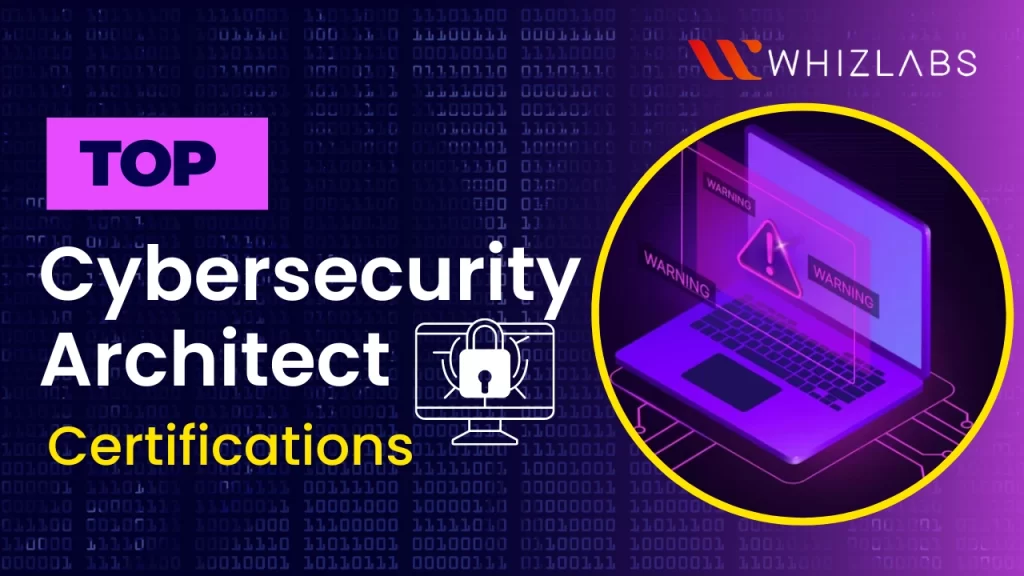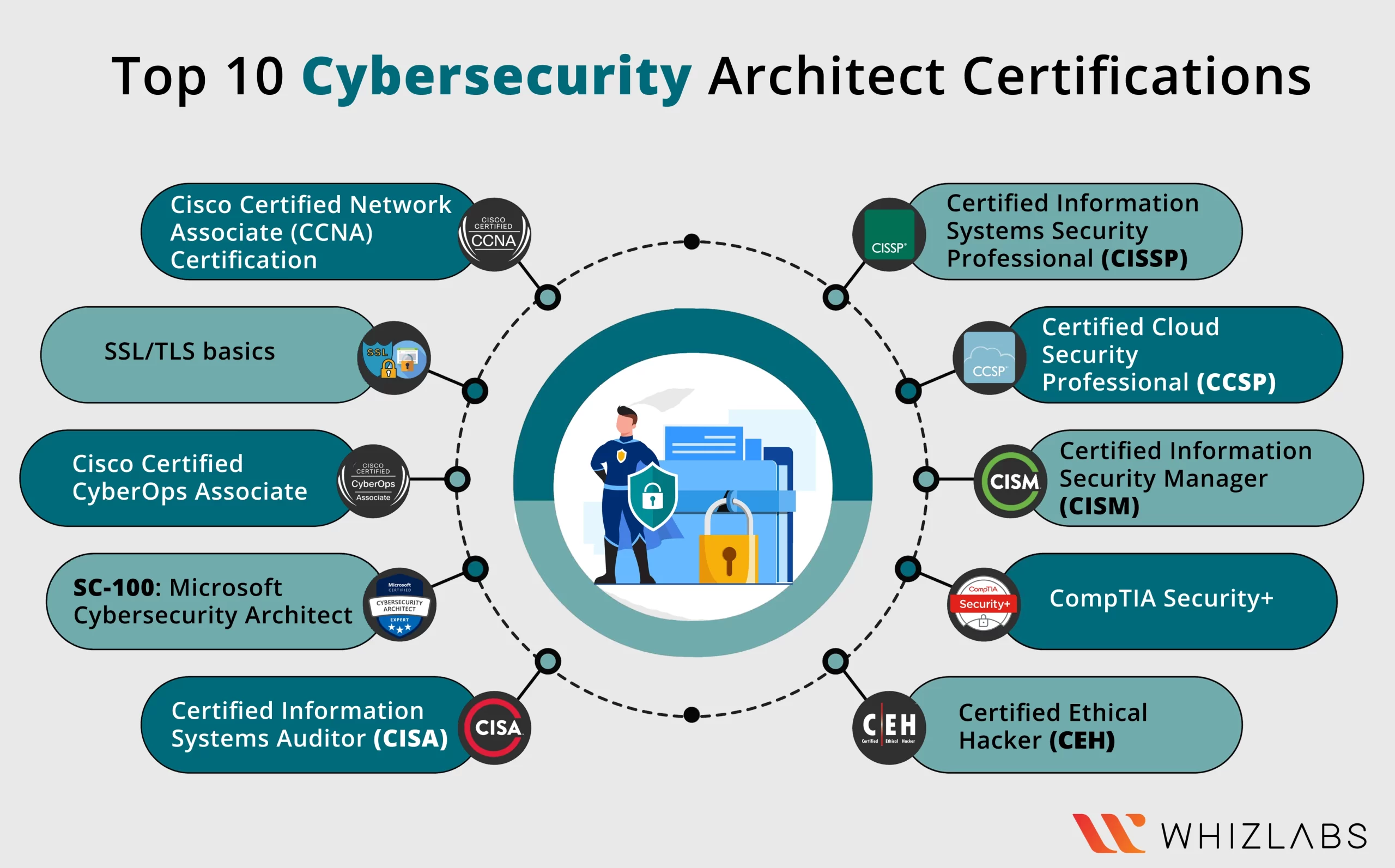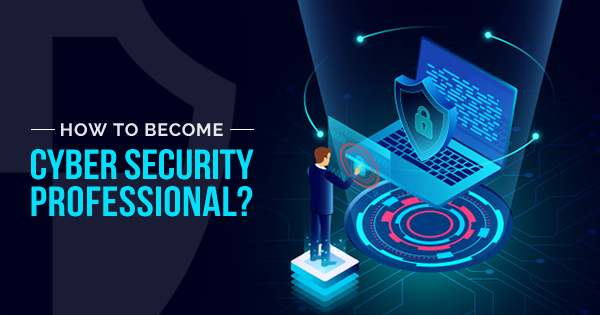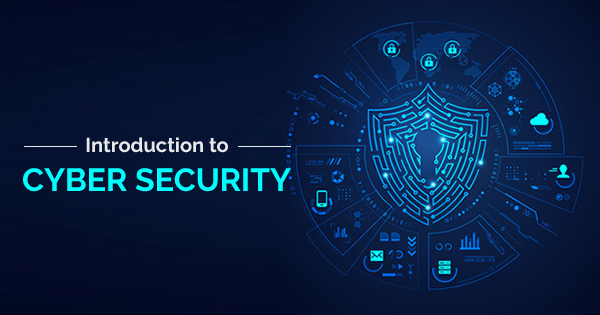What is the most important pillar for any organization in 2024? Profitability? Customer engagement? Sales volume? These are vital, but something makes it possible to achieve these things. DATA! Organizations cannot succeed without making informed, data-driven decisions. But more data in networking systems mean more cyber threats, breaches, data thefts, etc.
Cybersecurity architect certification comes into play in this time. A thoughtfully implemented cybersecurity architecture will help you save your data and system from various cybersecurity threats and attacks and help maintain privacy and users’ trust. Pretty much the reason today, almost all organizations are looking for professionals who are adept at building cybersecurity architecture.
To leverage this opportunity and level up your credentials, kickstart with cybersecurity training certifications. These are nuanced Cyber Security Certification courses that prepare you with all the skills necessary to get hands-on with cybersecurity architecture. This blog will cover the top 10 cybersecurity certifications you must check out.
But before that, let’s sneak peek into what cybersecurity architecture is and why it is important. Time to dig in!
What is cybersecurity architecture?
A cybersecurity architecture or network security architecture is a process for building an ecosystem that protects data in the network from external and internal threats, loss, and attack. It’s basically a foundation to protect your forte against cyberattacks and it helps in cybercrime prevention.
Also Read: What are the Top 5 Highest Paying Cybersecurity Jobs?
Besides, a cybersecurity architecture involves many frameworks to identify security risks, implement controls to address them, and troubleshoot issues. It defines how efficiently you can protect your critical and sensitive data while maintaining availability for business operations.
Apart from this, your cybersecurity architecture framework should be dynamic, agile, and flexible to adapt and provide protection coverage for your organization amid ever-evolving cybersecurity threats. It must include three elements:
- Policy-related components
- Standards and frameworks
- Network quintessential
These cybersecurity best practices should be diligently implemented to fortify an organization’s defenses, mitigate risks, and protect sensitive data from potential cyber threats.
Importance of taking cybersecurity architect certification/course
Following a cybersecurity architect course is essential to acquire specialized knowledge, validate expertise, and gain the necessary skills for designing robust security solutions that safeguard organizations against emerging cyber threats. Some importance are listed as follows:
- Cybersecurity architect helps to secure sensitive data assets like intellectual property, financial data, and private user information from theft, fraud, and other incidental threats.
- It helps ensure regulatory compliance. Your organizations must align with numerous industrial and jurisdiction-specific cybersecurity regulations. Having a cybersecurity architecture in place will ensure you comply with all regulatory norms, reducing the chances of penalties.
- Cyber attacks disrupt your operations, leading to lost revenues, margins, reputational damage, etc. A cybersecurity ecosystem will help ensure your teams identify threats beforehand and take necessary action while saving the organization from extreme situations.
- It helps improve the bottom line. One way to build customer trust is by being transparent about your cybersecurity architecture. This means being upfront about the measures you have in place to protect their data and systems. Customers who have been victims of security incidents in the past are especially likely to appreciate this transparency.
Top 10 cybersecurity architect certifications
Taking the discussion ahead, here are a few popular cybersecurity architect certifications you must consider if you are looking for a career in cybersecurity. Let’s have a look at them one by one.
Pro-tip:
Before you dive headlong into security architect certification: do your research before you sign up! It’s important to look into the organization offering the certification and make sure they have a solid reputation in the industry. You don’t want to waste your time and money on a certification that isn’t widely recognized or respected.
Another thing to consider is the specific skills and knowledge you’ll need to master in order to pass the certification process. Do some research on what the certification entails and make sure you are up for the challenge.
1. Certified Information Systems Security Professional (CISSP)
The CISSP is an internationally recognized cybersecurity architect certification that shows you have the knowledge and experience to design, deploy, and handle top-notch cybersecurity programs. CISSP usually takes about six months of preparation, depending on your expertise and familiarity with the cybersecurity domain.
Next, the exam is six hours long and you need to attempt 250 questions. And to be eligible for the exam, you will also need at least five years of work experience in two or more domains of the (ISC)² Common Body of Knowledge (CBK). As for the cost, you need to pay USD 599 for registration.
Also Read: How to Become a Cyber Security Professional?
2. Certified Cloud Security Professional (CCSP)
CCSP cert is a program that validates your understanding of cloud security principles and best practices. The International Information Systems Security Certification Consortium offers the certification and covers six domains. It includes everything from cloud computing and risk management to legal and compliance issues.
To be eligible for this exam, you will need 5+ years of experience working in IT, with three of those years working in one or more of the six CCSP domains. The exam costs USD 599.
3. Certified Information Security Manager (CISM)
Certified Information Security Manager or CISM is an internationally recognized certification that’s administered by ISACA. The course helps you demonstrate your expertise in areas like risk management, information security governance, incident response, and compliance management.
To get certified, you will need to answer 150 questions and secure at least 450 out of 800. As a part of the prerequisite, you will need to have at least five years of experience in one or more of the four domains covered by the exam. Now, talking about cost, if you are a member, USD 575. For non-members, the registration cost is USD 760
4. CompTIA Security+
CompTIA Security+ or SY0-601 validates your skills and knowledge needed to perform IT security functions effectively. It covers myriad topics, including system security, network infrastructure, cryptography, access control, authentication, external attack, and operational security.
The exam typically takes about 90 minutes and has 90 multiple-choice and performance-based questions. You need to score at least. The exam will cost you USD 392. Speaking of prior requirements, you should have at least two years of experience in IT administration with a focus on security. In addition, you also need CompTIA Network+ certification or equivalent knowledge.
5. Certified Ethical Hacker (CEH)
The certified ethical Hacker (CEH) certification is a cybersecurity course offered by the International Council of Electronic Commerce Consultants (EC-Council). The cert aims to equip you with the skills and knowledge needed to identify, assess, and prevent security vulnerabilities in computer systems. As a CEH-certified professional, you can use ethical hacking techniques to protect networks from malicious attacks.
Speaking of the exam, covers 125 questions in the form of MCQs and costs USD 850. You need to score at least 65-80% to qualify for the exam. The cert will also require you to have at least 2+ years of experience working in the security domain and prove your skills through the application process.
6. Certified Information Systems Auditor (CISA)
The Certified Information Systems Auditor (CISA) will be a globally recognized IS audit control and assurance course. This cert highlights your audit experience and understanding of:
- Managing vulnerabilities
- Ensuring compliance
- Instituting controls in an organization, etc.
The exam covers five domains and requires you to score at least 450 out of 800 to qualify. There are 150 questions to be finished within 240 minutes. To be eligible for the certification, you need a minimum of five years of experience in IS/IT audit, control, assurance, and security.
7. SC-100: Microsoft Cybersecurity Architect
The SC-100: Microsoft Cybersecurity Architect certification imparts knowledge on designing strategies for trust architecture, application and data, and security for infrastructure. You will also learn how to evaluate governance risk compliance (GRC), security operations and technical strategies and dive into security priorities and best practices.
However, to appear for this certification, you need to qualify for SC-200, SC-300, AZ-500, or MS-500 certifications. Besides, you need in-depth understanding and advanced experience in areas like:
- Identity and Access
- Platform protection
- Security operations
- Securing data and apps
- Hybrid and cloud implementations
The exam costs USD 165, and the cert will be valid for 12 months.
8. Cisco Certified CyberOps Associate
The Cisco Certified CyberOps Associate certification is a great way to validate the tactical understanding and abilities required to detect and troubleshoot cybersecurity threats. You will also learn about host-based analysis, network intrusion analysis, security concepts, security monitoring, and security policies and procedures.
Speaking of the exam, the cert is valid for 3 years and costs USD 300. You need at least 750-800 marks out of 1000 to pass and attempt 95-100 questions within 120 minutes. To be eligible, you must be familiar with basic security terminologies, viz., SOAR, SIEM, threat intelligence, malware analysis, etc.
9. SSL/TLS basics
SSL/TLS certification dives into how to enable systems to verify each other’s identity and establish encrypted network connections using the SSL/TLS protocol. These elements are used within a public key infrastructure (PKI), which is a cryptographic system allowing you to define the identity of the opposite party using certificates if they both trust a third party. Basically, SSL/TLS certificates act as digital identity cards that ensure secure network communications identify websites on the Internet, and resources on private networks.
10. Cisco Certified Network Associate (CCNA) Certification
The Cisco Certified Network Associate (CCNA) validates your skills in building, configure, operating, and troubleshooting networking solutions. The exam is tailor-made for professionals wishing to enhance their skills in managing and optimizing advanced networks. This cert can help you stand out in the networking industry and show your expertise in handling complex networks.
The exam is valid for 3 years and costs you USD 300. It’s 120 minutes long and consists of 100-120 questions in the form of MCQs, drag-and-drop, and fill-in-the-blanks. You need at least 825 out of 1000 to qualify. Regarding eligibility criteria, you must have a year or more experience working with implementing and administrating CISCO systems.
Career Prospects and salary
Organizations are increasingly looking for skilled cybersecurity architects who are adept at protecting IT infrastructure from incidental threats and reducing disasters due to network intrusions. Though, owing to a scarcity in supply but skyrocketing demand, wages for cybersecurity architecture experts are soaring past the roof, leading to excellent benefits packages.

If you wish to land the best jobs in this field, keep abreast of the latest knowledge and ensure your credentials highlight your cybersecurity architecture skills to potential employers. And the best way to do this is to get yourself certified. Cybersecurity architecture certifications bearing big names like CISCO, CompTIA+, Microsoft, ISC2, etc., can decide who gets hired.
The salary prospects for cybersecurity architects are bright, shining, and promising. CyberSeek says the average annual salary can go as high as $129,000. PayScale, on the other hand, reveals the median salary to be approx $122,612.
Cybersecurity Architect Skills:
A proficient cybersecurity architect must possess various essential cybersecurity hard skills, including:
- Proficiency in operating systems like Windows, UNIX, and Linux.
- In-depth understanding of recognized security frameworks such as ISO 27001/27002, ITIL, and COBIT.
- Strong grasp of perimeter security measures like firewalls, IDS/IPS, network access controls, and network segmentation.
- Ability to develop and define network security architectures.
- Hands-on experience with wireless security components such as routers, switches, and VLAN security.
- Knowledge of security concepts concerning DNS, encompassing routing, authentication, VPN, proxy services, and DDOS mitigation.
- Familiarity with third-party auditing and cloud risk assessment methodologies.
Cybersecurity Architect Role:
The Cyber Security Architect Role involves:
- Designing and implementing comprehensive security solutions for an organization’s IT infrastructure, applications, and data. They analyze potential risks, vulnerabilities, and threats to create robust defense mechanisms and ensure the confidentiality, integrity, and availability of critical information.
- Security Architects collaborate closely with IT teams, stakeholders, and management to understand business objectives and align security measures accordingly. They play a pivotal role in establishing security policies, standards, and procedures, and continuously monitor and assess the effectiveness of security controls to adapt to evolving cybersecurity challenges. (eg: phishing attacks, data breaches, etc..)
Summary
Hope this blog helps you understand the nuances of cybersecurity architecture, career prospects and salary, and some of the top cybersecurity architecture certifications preferred by the industry. Certifications are the best way to develop your skills and define your growth trajectory for your cybersecurity industry career.
However, you must choose the right cybersecurity architecture certifications. Some of the certifications are of advanced level. If you are new to the domain, choosing certs like CCNA or SC-100 can give you quite a lot of trouble. So, make sure you research thoroughly before diving headlong.
Also, each of these certifications would need updated and authentic resources and study materials. Whizlabs offer best-in-class training programs that include countless exam practice papers and sample questions, video lectures curated by industry experts, and 24/7 access to special Whizlabs resources. You can also try out our hands-on labs and sandboxes to get the demo experience of cloud infrastructures, learn, and experiment. Wish to learn more? Reach out to our consultants today!
- A Tour of Google Cloud Hands-on Labs - December 12, 2023
- Mastering Azure Basics: A Deep Dive into AZ-900 Exam Domains - December 4, 2023
- Exploring the Benefits of Validation Feature in Hands-on Labs - October 10, 2023
- 20+ Free MD-102 Exam Questions on Microsoft Endpoint Administrator - September 27, 2023
- 20+ Free MS-102 Exam Questions on Microsoft 365 Administrator Certification - September 25, 2023
- AWS Certified Developer Salary in 2024 - September 19, 2023
- Guide to SharePoint, OneDrive, and Teams External Sharing in Teams - September 10, 2023
- What is Cross-Tenant Synchronization | MS-700 Certification - August 31, 2023




